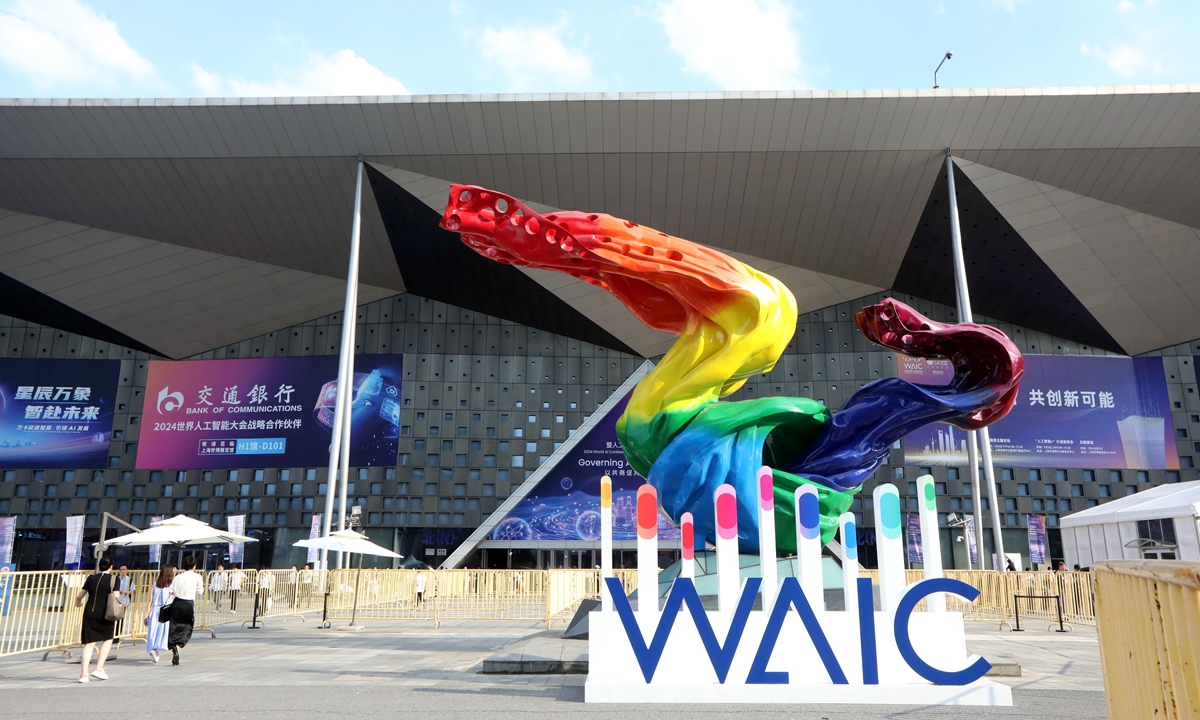
The main venue of WAIC 2024 Photo: VCG
Chinese AI companies are showcasing their latest upgrades on large models, challenging ChatGPT-4 at the World Artificial Intelligence Conference (WAIC) in Shanghai in response to US firm OpenAI's recent decision to suspend services to Chinese developers.
The moves are the latest attempts by Chinese firms to catch up in AI capabilities and strengthen China's technological self-reliance, despite the US technology blockade on Chinese firms.
US firm OpenAI is planning to restrict access in China and some other countries to its application programming interface (API), a platform that allows developers of other products to integrate its AI models from July 9, according to media reports. The move is seen as a push from the US to hamper China's technology development.
However, at the WAIC, many Chinese AI companies have unveiled plans to help developers and businesses smoothly transition to domestic solutions and see this as an opportunity to attract more users and propel the domestic development of large models.
One of these companies, SenseTime, said at the WAIC on Friday that its large model SenseNova 5.5 has made multiple upgrades in mathematical reasoning, English proficiency, and instruction following in the past two months, bringing it on par with GPT-4 in multiple capacities.
SenseTime recently launched a plan to offer dedicated consultants to help domestic OpenAI users transfer to its large model SenseNova at zero cost.
Alibaba also announced at the WAIC on Friday that in the past two months, the download count of its open-source model "Tongyi Qianwen" has doubled, surpassing 20 million. The Tongyi Qianwen-Max has recorded a score tied with GPT-4 Turbo, according to the company.
Wang Xiaoming, a product manager at Tongyi Qianwen, told the Global Times on Friday that as a completely Chinese-made and self-developed large model, Tongyi Qianwen has the capacity to fully meet the needs of domestic users.
"We observed a significant number of developers and users turning to Tongyi Qianwen large model and API. In terms of technology, we are catching up with and have even surpassed ChatGPT-4 in some capabilities, particularly in the processing of long documents, images, audio, and video," Wang said.
Liu Qingfen, chairman of Chinese AI company iFlytek, told the Global Times that in light of the OpenAI suspension, iFlytek is able to align with the capacity of various large models that are currently being used in frontline situations.
IFlytek recently unveiled the large model SparkDesk V4.0, which has made significant advances compared with GPT-4 Turbo in the fields of text generation, language understanding, knowledge question answering, logical reasoning, and mathematics, Liu said.
Chinese companies are also making significant efforts to meet the growing demand for domestic AI large model training, despite being blocked by the US from accessing advanced AI chips.
During WAIC, Moore Threads Intelligent Technology, designer of GPUs tailored for AI training, announced a major upgrade of its flagship AI data center solution KUAE.
Commenting on the China-US tech rivalry landscape, Liu said that it is a long-term path that requires continuous development, combining the nation's efforts in computing power building, and aggregating data resources.
The Ministry of Industry and Information Technology said on Friday that it is promoting technology breakthrough in key areas including humanoid robots, brain-machine interfaces, metaverse, next-generation internet, 6G, quantum technology, atomic-level manufacturing, deep-sea and aerospace development.

